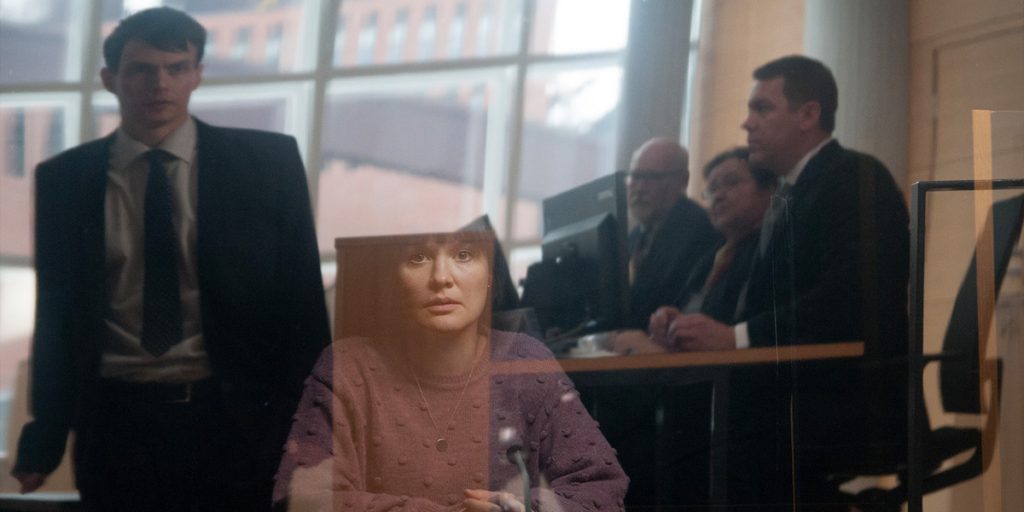Force of Habit paints a portrait of strength, resilience, and perseverance through claustrophobic narratives of male power women have to live through daily.
The Finnish feature film Tottumiskysymys, or Force of Habit, was born out of a one-off incident project which portrayed women’s everyday experiences of the exercise of male power. Under the careful handling of no less than seven directors (Reetta Aalto, Alli Haapasalo, Anna Paavilainen, Kirsikka Saari, Miia Tervo, Elli Toivoniemi, Jenni Toivoniemi), the six short films of the Yksittäistapaus project (an anthology series called “An Individual Case” in English) have been transformed into six narratives that are both bone-chilling and blood-boiling. The idea of ‘force of habit’, or the impulse to do something because one does it or has done it routinely, set the tone for the casualness and habituality with which this very serious topic is treated. Small and seemingly insignificant moments build up in intensity as the film progresses, until surely even male viewers have to catch on that something is seriously wrong with the instinctive bracing behaviour and helpless anxiety with which our lead characters have to confront the male-gaze dominated world around them.
The six episodes show sexualized violence to a varying degree of physical intensity, while building up the mental intensity of the moments the women find themselves in. It depicts an accurate picture of how society deals with sexual violence, such as Katja’s (Seidi Haarla, Hiljaisten palvelijat) female co-workers who accuse Katja of taking her #metoo-accusation too far, or the female bus passenger who catches Milja’s (Pinja Sanaksenaho, Posse) silent call for help but averts her eyes and pretends not to see. However, the film’s focus is specifically on the impact of sexual violence on the people who were violated. Force of Habit does an excellent job of both making the violence that happens seem insignificant and not so bad, and showing the devasting impact these brief encounters can have on its victims. Its effect on your own intuition is so strong that at the end when we follow Emppu (Juila Lappalainen, Joulumaa), walking home hrough a dark and empty park at night, you are as convinced as she is that the person walking behind her has bad intentions, until he catches up and continues to walk past her.
For female viewers, Force of Habit feels like watching a tense and claustrophobic third-person rewind of some experiences we’ve mostly all had in the past, and some experiences we fear and hope never ever to find ourselves in. Emppu, a theatre actress, finds herself practising a violent rape scene, complete with recordings of her screams for help, as well as calmly discussing with the dressmakers how many dresses shall be ripped to shreds and how. In a powerful moment near the end of the film, we hear recorded screams reverberate across the theatre building, where a disinterested waitress fills up the champagne glasses. It is as if the film forced you to listen to the helpless screams for help, which are often silent. While we hear the applause at the end of Emppu’s stage performance, we watch as she washes the (fake, thank god) blood from her legs.

The ‘light’ violations of Hilla (Krista Kosonen, Miami, Kätilö) seem like nothing compared to the heavier and more impactful situations Emmi (Suvi Blick, Paras Vuosi Ikinä) and Aleksi (Johannes Holopainen, Tuntematon Sotilas, Helene) encounter. These ‘light’ violations are still concerning, as Hilla is being groped by a man while she is vacationing with her partner Kristian (Eero Ritala, Onnela, Häirötekijä), and Milja who is chatted up and tormented while on the bus to school because she refuses to engage in a conversation with two older boys who want her to join for a gathering involving booze and bubble baths. Whereas Emmi’s narrative only portrays her (failing) efforts of trying to sleep while a male friend corners her in her bed(room), Aleksi’s narrative, the only male lead character, shows how an attorney is assigned an aggravated rape case at the last minute. It illustrates how the Finnish justice system fails at bringing perpetrators to justice. Though Emmi’s fate is not explicitly shown to us, we are made aware of what happens to her through her appearance in Aleksi’s narrative, where she walks towards the courtroom where Aleksi’s client just walked out of.
Katja’s narrative displays the destructive forces female denial can have on a victim’s sanity. While on the subject of male power abuse, she tells her female co-workers of a male co-worker trying to coerce her into sex during last year’s office afterparty. Katja’s experience reinforces its impacts through her co-workers disregarding and belittling the effect they had. In all the experiences put forward in the various narratives the incidents are always on the verge of being brushed away. Even-though society demands women to forget now defused situations, the lingering impact shown in Force of Habit makes these women stronger. The gross injustices towards women, on both personal and institutional women is the film’s main message and there is no escaping the pain and dread you will feel for these characters, knowing what is coming next.
Part of the film’s heightened tension is due to Yva Fabricius’, Anniina Kauttonen’s and Otto Heikola’s phenomenal editing. They truly convey the feeling of knowing scenes shouldn’t go where they do and how the lead characters are still cautious of the change in atmosphere. The reluctance to interact with a man because you already know what is coming hangs vibrant in the air. Halfway through Force of Habit, you start questioning the intentions of every character, male or female, that is not our protagonist. After all, it’s astonishing to think that more than half of young women in Finland have faced, and will face, sexual harassment. I am somehow glad that the film’s total runtime is just over 1 hour and 15 minutes, as I really could not bear to wince once more for every shot of recognition that I could feel in my heart and guts while I watch devastating things happen to our lead characters. The negligence and suppression of the impact of male power abuse in society is clear in what Aleksi is told about his aggravated rape case: “These cases are pretty basic. But we’ll find you something bigger next time.”
Force of Habit was screened at the Raindance Film Festival, where it won Awards for “Best International Feature” and “Best Screenplay”.

